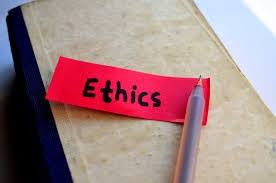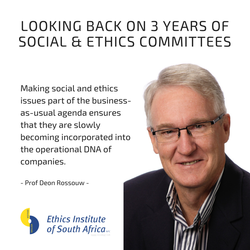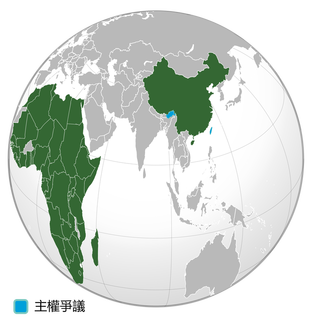 What does a flashmob and industrial theatre have to do with building ethical organisations? According to some speakers at the 5th annual ethics conference held on 18 May at Gallagher Convention Centre, it is alternative creative approaches that will get the message of the importance of ethical conduct across. To build an ethical organisation, four key groups of stakeholders need to be persuaded that ethics is good business and needs to be integrated into how an organisation and its partners go about their daily business. Conventional methods of persuasion like training and giving speeches need to be complemented by others that are potentially more impactful, such as singing, humour and industrial theatre. “When one is building a genuinely ethical organisation, drafting policies and codes is only the first step. Then begins the long business of persuading these four key stakeholder groups—leadership, employees, supply chain partners and industry peers—to buy into ethics,” says Professor Deon Rossouw, CEO of the Ethics Institute of South Africa (EthicsSA), host of the event. Conference delegates were treated to a flashmob and a piece of industrial theatre that showed just how effective alternative interventions could be. Johan van Zyl, Group CEO at Sanlam argued strongly that the process of building an ethical organisation has to begin at the top, beginning with the board, which has to commit publicly to ethics above the pursuit of short-term profits. Tolerance for deviation from the company’s ethical code has to become less and less the higher up the organisational structure it occurs, Dr Van Zyl said. Building an ethical organisation is first and foremost a top-down process. As was made clear in a subsequent panel discussion introduced by Professor Shirley Zinn, that while the “tone at the top” is vital, it also needs to become the “tune in the middle”. Ethical standards must become an integral part of how the organisation does business. Brian Leroni, Group Corporate Affairs Executive at Massmart, made the case for bringing the supply chain on board as well. He noted how deeply a company could be embarrassed—and worse—by the unethical behaviour of members of its supply chain. Some companies who have outsourced all or part of their manufacturing to the Far East have already experienced some of the negative effects of unethical practices by suppliers. However, Leroni emphasised how difficult and lengthy such a process was, and warned that big companies needed to act ethically when undertaking it. Like other stakeholders, suppliers have to be persuaded that ethics make for good business, and not simply bullied into it—in itself an unethical action, after all. Sabine Dall’Omo, CEO of Siemens South Africa, addressed the fourth group of stakeholders, a company’s industry peers. Collective action is essential particularly in industries in which there are entrenched corrupt practices and, consequently, a dramatically uneven playing field. Dall’Omo shared the hard lessons Siemens itself learned by letting itself become complicit in such practices. “All the speakers emphasised the need for both creativity and perseverance in persuading these and other stakeholder groups to buy into the organisation’s ethical standards—but they also stressed the benefits to be gained. Being ethical means fewer sleepless nights but, even, more to the point, improved business performance and results,” Professor Rossouw concludes. ENDS MEDIA CONTACT: Juanita Vorster, 079 523 8374, [email protected], www.atthatpoint.co.za For more information on EthicsSA please visit: Website: www.ethicssa.org LinkedIn: Ethics Institute of South Africa Facebook: Ethics Institute of South Africa
0 Comments
Building credibility for the sustainability agenda Three years ago on 1 May, the requirement in the new Companies Act for social and ethics committees came into effect. It’s probably not an exaggeration to say that confusion reigned at the time. The Act and its enabling regulations were just not clear, and peoples’ aversion to change was complicated by genuine bewilderment. So great was the confusion that EthicsSA and the Institute of Directors in Southern Africa began running workshops to help companies get a handle on this new concept. Perhaps the biggest achievement of this new committee is that sustainability issues are now a regular board agenda item. Most social and ethics committees have settled into a rhythm of meeting prior to scheduled board meetings, and their reports are tabled at the subsequent board meeting. As a result, sustainability issues have become a regular subject for top-level discussion and scrutiny. It is impossible to overestimate the long-term impact this is having—by making social and ethics issues part of the business-as-usual agenda, they are slowly becoming incorporated into the operational DNA of companies. A related achievement is that because these issues are being thought about and reported on regularly, the sustainability and integrated reports are becoming much more credible and useful. In truth, many of these reports were put together in a hurry and did not necessarily reflect what truly went on. But when management has to report regularly on these issues, the content of the sustainability report is generated by institutional processes, and thus better reflects what happened. However, it needs to be noted that there remain a number of challenges to be overcome. First, the inexact and incomplete legislation and regulations continues to cause confusion. Legally, the position is still that the committee has only a social mandate. Leading companies have used King III as their guide and have incorporated ethics, but this is purely voluntary. It is to be hoped that this omission is rectified by legislators soon. A structural challenge is the fact that the mandates of social and ethics committees can overlap with other board committees, such as audit, HR and remuneration. These overlaps need to be addressed to prevent a “turf war” from developing. A more difficult challenge is the fact that most companies are still grappling with how to produce the right content and quality of reports for the social and ethics committee. Committee members tend to be non-executive, so do not have the inside knowledge to be able to assess the reporting, whereas managers are often uncertain about what needs to be reported. A contributing factor is surely the lack of performance indicators for social and ethics issues, which also means it is hard for all parties to move beyond compliance to assessing the impact of social and ethics performance. This expectation gap causes frustration all round. Based on EthicsSA’s interaction with hundreds of companies at various training sessions, our overwhelming conclusion is that the key success factor is a social and ethics committee whose agenda is closely aligned with the company strategy. This breathes energy into the committee’s operations because members can see the strategic importance of what they are doing, and the board and executive management can see that the company is deriving real value from the work done by the social and ethics committee. For example, as we have seen, a mine’s long-term sustainability is dependent on its relationship with the surrounding community and its employees—exactly the sort of area for which the social and ethics committee takes responsibility. To paraphrase, don’t ask what you can do for your social and ethics committee, but what it can do for you. If the committee is seen to be delivering value, it will continue to improve, creating a genuine virtuous cycle. ENDS MEDIA CONTACT: Juanita Vorster, 079 523 8374, [email protected], www.atthatpoint.co.za For more information on EthicsSA please visit: Website: www.ethicssa.org LinkedIn: Ethics Institute of South Africa Facebook: Ethics Institute of South Africa  Prof Deon Rossouw warns that zero tolerance policies need the right balance between encouragement and punishment. Prof Deon Rossouw warns that zero tolerance policies need the right balance between encouragement and punishment. Companies or institutions, particularly those who have suffered a scandal of some kind, often resolve on a zero-tolerance policy for unethical behaviour. But this policy is likely to backfire if the right approach isn’t adopted, says the Ethics Institute of South Africa (EthicsSA). “A scandal has a hugely negative impact on an organisation and usually results in personal humiliation for its members, so deciding ‘never again’ is both understandable and laudable,” says Professor Deon Rossouw, CEO of EthicsSA. “But care needs to be taken because zero tolerance often translates into an overwhelming focus on the strict policing of rules, and that’s an approach that is not sustainable and can even be counterproductive.” The real issue here is the difference between extrinsic and intrinsic motivation for actions. A focus on policing and enforcement means that individuals never internalise, and appropriate for themselves, the desired ethical principles. The unintended consequence is a mindset of “if it’s not forbidden, then it must be allowed”, simply because people become used to being told what to do, and do not apply their minds to doing the right thing. In fact, it can be that people then begin to exercise their creativity to get round the rules and, as we all know, human creativity seems to be inexhaustible in this area! Professor Rossouw says that the same factors can be seen at play when it comes to safety regulations, say at a mine after a fatality. Managers often observe that the moment employees leave the work environment with its strict safety rules, they indulge in highly unsafe practices. In other words, the safety-first principle has not been internalised. To realise the intention behind a zero-tolerance approach—to prevent any future ethical breaches from occurring—it is necessary to take the longer route of convincing an organisation’s members that ethical behaviour is beneficial to them and the organisation, and is thus worthwhile on its own account. As part of driving this message home, he says, the greatest effort should go into recognizing and praising those who do act ethically, setting them up as role models, with much less time spent on policing and enforcement. According to Susan Krauss Whitbourne, Professor of Psychology at the University of Massachusetts Amherst, we model our behaviour on “individuals whose actions seem to be getting rewarded”.1 It’s thus vital that organisations pay due attention to rewarding publicly individuals who act ethically, in small and large matters. As part of the same process, the organisation’s commitment to ethical behaviour needs to be made crystal clear in the words and actions of its leaders, and everybody who infringes the ethical code must be held strictly to account. “It’s a question of striking the right balance between encouragement of the right behaviours and punishment of the wrong behaviours,” Professor Rossouw concludes. “It’s not that we shouldn’t formulate and enforce rules, but we have to get the context right in order to change convictions—that way, we will change the way people behave even when nobody is watching.” 1 Susan Krauss Whitbourne, “We all need role models to motivate and inspire us”, Pyschology Today 19 November 2013, available at https://www.psychologytoday.com/blog/fulfillment-any-age/201311/we-all-need-role-models-motivate-and-inspire-us ENDS MEDIA CONTACT: Juanita Vorster, 079 523 8374, [email protected], www.atthatpoint.co.za For more information on EthicsSA please visit: Website: www.ethicssa.org LinkedIn: Ethics Institute of South Africa Facebook: Ethics Institute of South Africa  A recent three-day dialogue between Chinese and African stakeholders has identified a number of actions to improve the business relationship between China and its African trading partners. “The three-day meeting was an intense and valuable process that identified some clear action points for the major role-players, with the aim of improving this important relationship to the benefit of both parties,” says Professor Deon Rossouw, CEO of the Ethics Institute of South Africa (EthicsSA), who hosted the Dialogue. China and Africa must share responsibility for ensuring mutual economic growth Overall, the dialogue concluded that both business and government, Chinese and African, shared responsibility for ensuring that China’s business presence in Africa was not just one focused on extracting raw materials, but one that stimulates African economic development as well. Public sector must create and enforce framework for investors When it comes to the government arena, delegates were clear that African governments have a responsibility to create and enforce a clear framework for foreign investors. In countries where such frameworks do exist and are enforced, relationships between Africans and Chinese businesses are noticeably better. The Chinese government also had a role to play by setting clear standards for Chinese companies working overseas. There has been some talk of introducing a corporate responsibility rating system which, Professor Rossouw believes, could make a positive contribution. In addition, if the Chinese government engaged with African civil society organisations, especially in relation to aid, it could materially improve the image of Chinese business on the continent. Private sector must be good corporate citizens Delegates agreed that Chinese businesses needed to build closer relationships with their host communities by acting as good corporate citizens. By taking their social and environmental responsibilities seriously, they would be positioned to break down the isolation in which many of them operate. “In particular, by working more closely with local businesses, Chinese companies could build cultural understanding and create more opportunities for everybody,” remarks Professor Rossouw. “One of the big gripes about Chinese businesses is that they often import all their own labour, and thus deny African citizens and businesses the opportunity to participate in massive infrastructure projects.” An issue that was raised for further discussion was how to reach informal Chinese traders who are operating in Africa without the assistance or sanction of the Chinese government, and often under the radar of their host countries as well. Civil society organisations must act as watchdogs Delegates felt that civil society organisations could continue to play an important role as watchdogs by undertaking in-depth studies of the impact of Chinese business in Africa. It was also felt that, by working together, African and Chinese civil society organisations could help build bridges between Chinese businesses and their African host communities. Business schools must focus on business culture training Both Chinese and African business schools have important parts to play. African business schools need to prepare business leaders for working with Chinese businesses, and their Chinese counterparts need to focus on training the next generation of business leaders in ethical leadership. The dialogue was attended seven stakeholders each from Africa and China, representing business, policy-making, government, academia and civil society. The CEO of Globethics, a worldwide ethics network based in Geneva, acted as a neutral facilitator. “All the delegates have committed to developing a detailed set of recommendations and ensuring it gets as much exposure as possible,” Professor Rossouw concludes. “We will also hold a second dialogue in China in 2015 to take the process forward.” Organised by EthicsSA in conjunction with the Centre for International Business Ethics in Beijing, the dialogue is the outcome of research conducted by EthicsSA earlier this year, which found that Africans were generally negative about the impact of Chinese business in their countries. ENDS MEDIA CONTACT: Juanita Vorster, 079 523 8374, [email protected] For more information on EthicsSA please visit: Website: www.ethicssa.org LinkedIn: Ethics Institute of South Africa Facebook: Ethics Institute of South Africa |
Welcome to the newsroom of The Ethics Institute. For media releases prior to August 2014 please click here.
Archives
August 2017
Categories
All
|

 RSS Feed
RSS Feed